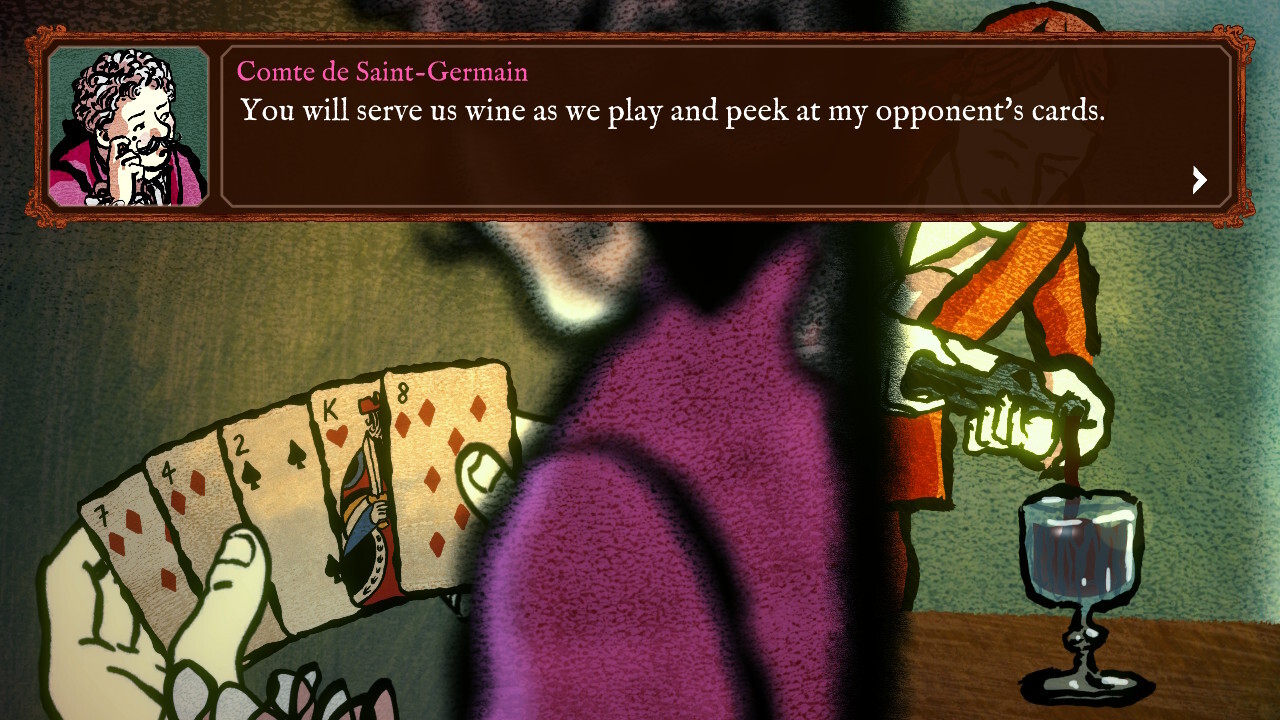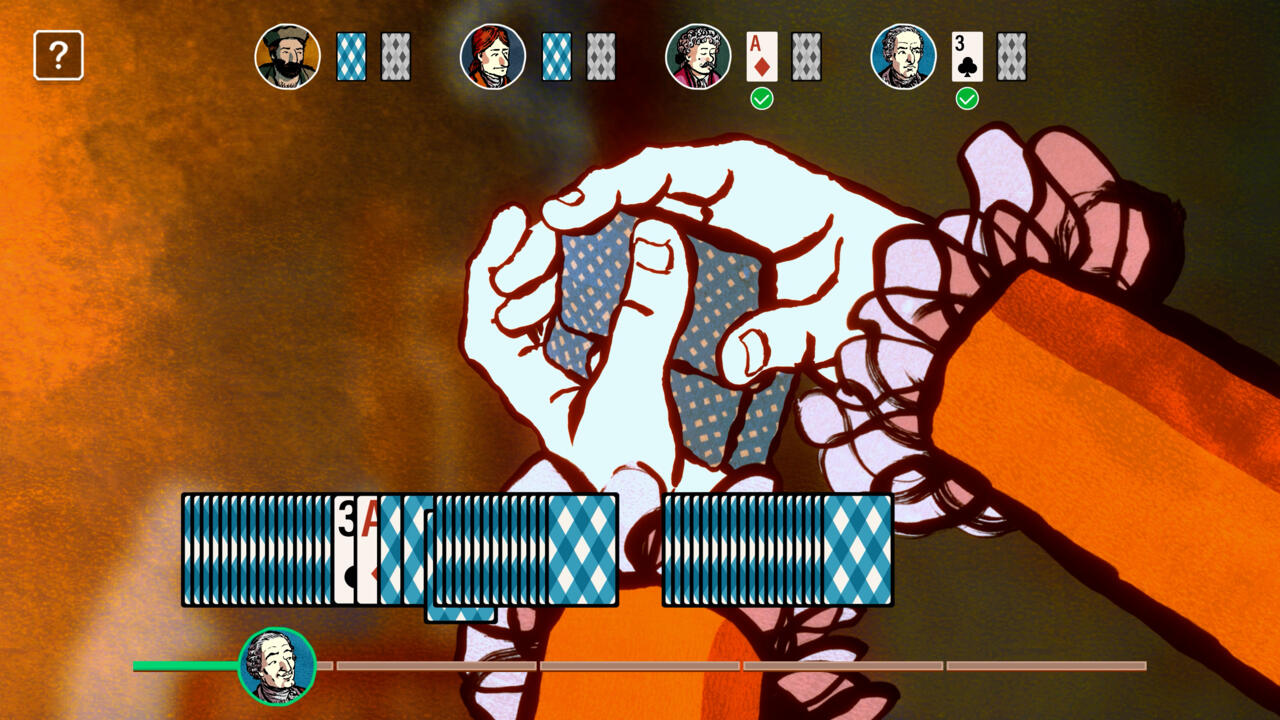Card Shark Tips For Beginners
How to cheat your way through 18th century France (and not get caught).
Card Shark is a dizzying lesson in card manipulation. It pins Nicolai Troshinky's admiration for the 1975 Stanley Kubrick film, Barry Lyndon, to Arnaud de Bock (Reigns, Pikuniku) and Nerial's resume of designing intuitive puzzlers that embrace creative thinking. It follows a young runaway mute who gambles their life away in an alternate history of 18th century France and in a very Devolver way, sprinkles in pirates, powdered wigs, fencing duels, monoprinted paintings of French architecture and neighboring countrysides, and a hidden royal conspiracy called The Twelve Bottles Of Milk.
It's out there for a game about card cheating, but that's the point. Card Shark features over 20-plus different cheating techniques derived from real-life iterations of card marking and deck switching, and it balances its oddities with mini-games and three difficulty levels that test your memory and quick thinking in high stress scenarios. The tension can be deafening, so we've put together a quick guide on how to cheat your way through 18th century French society without getting caught.
Focus on cheating, not winning
Despite what you think, Card Shark isn't about playing cards. It never really reveals what card game is being played across Agen, Espalion, Marseilles, and other quaint parts of southwestern France, and instead, it convinces you to minimize variables and focus on what matters most: the execution of a cheat. As an accomplice to the Comte de St-Germain, hand values are meaningless and players are responsible for executing the precise setup of new strategies in order to help him win the round and delay fellow gamblers from turning a simple trick into an unavoidable consequence.
Be smart (and careful) about betting
Timing is everything. Increasing a bet at any table has its positives (bigger payout, spicy gameplay), but doing so in the earlier rounds of a scene will only heighten your opponent's suspicion meter. Max it out and the table will disband for the night. Or in some cases, call for your head. Upping the bet at farming areas (i.e. The Barn) can help with scenes that require a larger purse and entry fee, and with enough coin, you can fail at least once per scene and still progress the main story.

Develop your own memory techniques
Card Shark's cheating strategies vary from simple (The Three Card Monte) to absurdly complex (The Baby False Shuffle) and using pattern recognition and memorization can help anyone stuck in a bind. Techniques like The Bottle Of Cahors and The Indiscreet Fingers are used to signal an opponent's strongest card suit and can benefit from applying a phrase to a specific suit and action (i.e. "hearts full" = wipe table clockwise) or creating an acronym for ranking individual cards (AKQJ = Ashton Kutcher's Quinoa Jambalaya). The game uses its own patterns as The Stealthy Painter marks the backs of different high cards with an actual paintbrush, but it also leaves the door open for deck memorization and other advanced concepts with strategies that exploit stolen cards and duplicates.
Practice, practice, and practice
Since they're not perfect 99.9% of the time, all new techniques can be rehearsed as often as possible before they're performed at a table or in a scene. There are 28 strategies in total, with some card tricks being new variations of others, and it can be tedious to keep tabs on terminology like bottom drags, riffle shuffles, reverse cuts, and injogs--a card that is moved during an overhand shuffle to stick out from the inner end of a deck. Practicing scenarios can help with memorization habits-especially since scenes only use one trick per round--and they can also assist with the unique timing of Nerial's thumbstick gestures and the rhythm of collecting, shuffling, and re-dealing a deck of cards.

The pause button is your friend
Similar to other strategy titles and deckbuilders, Card Shark can throw the entire kitchen sink at you in a heartbeat and immediately follow it up with an endless charade of anxiety. So if you are feeling an immense amount of pressure, take a breather! Cheating isn't exactly easy and taking a moment to pause the game during a complex technique can help you revise new signals, card values, and recognition skills, and even re-enact specific control schemes that are unique to a scene.
Always read the room
Troshinsky's rewrite of France's Age of Enlightenment is a gambler's paradise full of personas who live and die by two things: riches and secrets. They--alongside the famed Comte himself--are willing to do whatever it takes to obtain knowledge of either, so always read the room and be prepared for an unexpected turn of events. Tables can attract unwanted guests (and modifiers) and an ordinary card game can spiral into a cliff side duel with Theodore von Neuhoff, the King of Corsica, or a romantic dinner party for two with an undead host who calls herself The Lady Of Bones.
Got a news tip or want to contact us directly? Email news@gamespot.com
Join the conversation